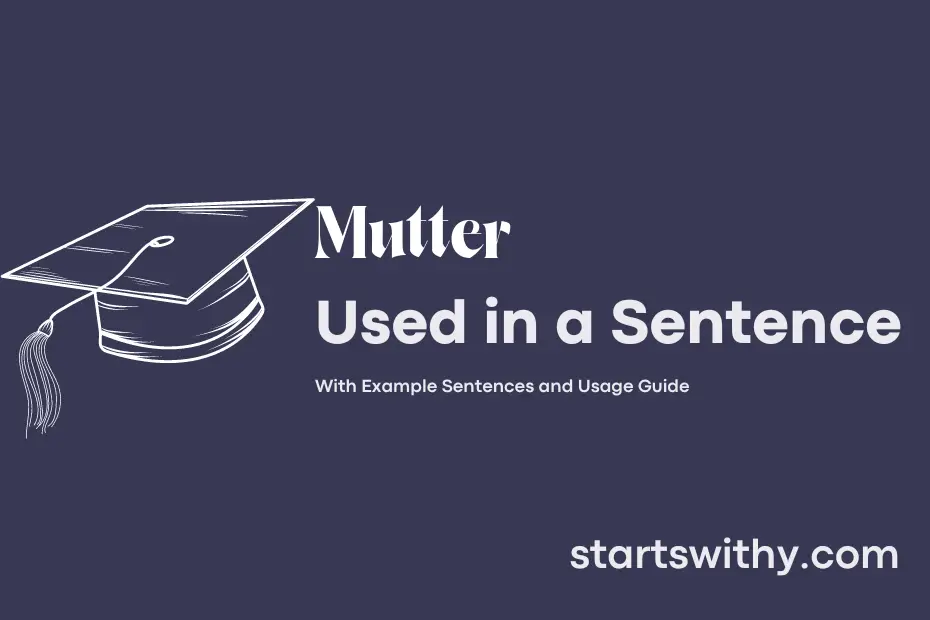Do you know what it means to “mutter”? Muttering is the act of speaking quietly and indistinctly, often in a grumbling or complaining manner.
When someone mutters, they are typically expressing their thoughts or feelings under their breath, making it difficult for others to hear or understand them clearly. This type of speech is often characterized by its low volume and lack of enunciation.
7 Examples Of Mutter Used In a Sentence For Kids
- Mutter quietly when you are thinking.
- Sometimes people mutter when they are feeling shy.
- Do you ever mutter when you are sleepy?
- It’s okay to mutter to yourself sometimes.
- Listen carefully, you might hear someone mutter in the library.
- Remember to use your inside voice when you mutter.
- Can you mutter a secret to me?

14 Sentences with Mutter Examples
- Muttering under your breath during a boring lecture can be a surefire way to stay awake.
- It’s common to hear students muttering about the long queues at the campus cafeteria.
- When faced with a difficult assignment, some students tend to mutter to themselves as they work through it.
- During exam season, you’ll often catch students muttering formulas and equations to themselves as they walk to class.
- You might hear students muttering about the slow internet speed in the hostel common room.
- In the library, it’s not unusual to hear students muttering while searching for a particular book or resource.
- While waiting for their turn at the photocopy machine, students may often mutter about the long line.
- Muttering complaints about the canteen food quality has become a daily ritual for many students.
- Some students tend to mutter study tips and reminders to themselves while flipping through their notes before an exam.
- You can spot stressed-out students muttering about deadlines and assignments while rushing to submit their work.
- During group projects, you might overhear students muttering about unequal workload distribution among team members.
- Muttering about the lack of study spaces on campus has become a common gripe among students.
- When the projector malfunctions during a presentation, students may start muttering in frustration.
- While waiting for the bus after a long day of classes, you might hear students muttering about the delayed schedule.

How To Use Mutter in Sentences?
To use the word “Mutter” in a sentence, follow these simple steps:
- Understanding the Meaning: Firstly, it’s important to know that Mutter is a verb that means to speak quietly and unclearly. It is often used to describe someone speaking in a low tone or grumbling to themselves.
- Select the Context: Think about a situation where someone is speaking quietly or grumbling to themselves. For example, “She would mutter complaints under her breath during the meeting.”
- Constructing the Sentence: When using Mutter in a sentence, place it in a context where someone is speaking quietly, grumbling to themselves, or expressing discontent in a low voice. For instance, “After the argument, he would often mutter apologies when no one was around.”
- Practice: To get comfortable with using the word Mutter in sentences, try incorporating it into your daily conversations or writing exercises. This will help you become more confident in using the word accurately.
By following these steps and practicing regularly, you will soon feel comfortable and proficient in using Mutter in a sentence. Remember to pay attention to the context and meaning to ensure that your sentence accurately conveys the intended message.

Conclusion
In conclusion, sentences with “mutter” often involve speaking quietly or indistinctly, reflecting a low volume or mumbled tone of expression. Whether used to convey frustration, discontent, or secrecy, these sentences typically communicate a sense of reluctance or hesitation in the speaker. By muttering, individuals may attempt to avoid attracting attention or may use this manner of speech to express their emotions subtly.
Overall, sentences with “mutter” can indicate a range of feelings and attitudes through the subdued and unclear mode of communication. This word adds depth to dialogues and narratives by providing insight into characters’ inner thoughts and emotions, offering a glimpse into their mindset and mood through the subdued yet impactful use of language.



